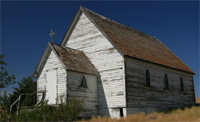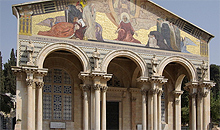Meanwhile, Saul was still breathing out murderous threats against the Lord’s disciples. He went to the high priest and asked him for letters to the synagogues in Damascus, so that if he found any there who belonged to the Way, whether men or women, he might take them as prisoners to Jerusalem (Acts 9:1).
Then the church throughout Judea, Galilee and Samaria enjoyed a time of peace and was strengthened. Living in the fear of the Lord and encouraged by the Holy Spirit, it increased in numbers (Acts 9:31).
There is a certain rhythm to life in the kingdom of God. Ups and downs, good times and hard times, peaks and valleys.
But, frankly, we're not very fond of that rhythm. We'd prefer to avoid anything that messes with our routine. We like stability and predictability. We are fond of our habits and traditions and comfortable customs. Transitions worry us. For many Christians, change is problematic.
Yet, life in the kingdom seldom stands still. We as individuals, our churches, and our world are in constant transition from thriving to struggling, confidence to fear, effectiveness to frustration — and back again! Our churches wax and wane. There are times of peace and times of tension. We speak effectively to the world... then we speak only to ourselves. Sometimes the mission of God's people is all that matters... sometimes other things take precedent.
If we must experience change, we'd prefer only the positive and joyful kind. (Be honest!) We want to be the Jerusalem church in those early, heady days. We love being part of a church on the rise. We want the excitement, the miracles, the explosive growth.
But we're not so fond of the difficult changes: persecution, struggle, decline, upheaval... new audiences whose language we do not speak... new mountains we'd rather not climb. If change is in the air, we'd rather avoid the kind that throws us into confusion and conflict and discomfort.
To tell the truth, most of us want the best of the kingdom without the rhythm of the kingdom... the flow without the ebb... the growth without the decline.
 Without the rhythm, we would be sorely tempted to settle in for the long wait, circle the wagons, and focus on defense. Without the rhythm, we might avoid any risk, any gamble for God's purposes.
Without the rhythm, we would be sorely tempted to settle in for the long wait, circle the wagons, and focus on defense. Without the rhythm, we might avoid any risk, any gamble for God's purposes.
Yet the rhythm of the kingdom continues to surprise us with times of drought, periods of upheaval, "conflicts within and fears without." The rhythm keeps us off-balance, throws us off our stride, and forces us to focus once more on what we are doing and why. Everything is going great... and then the unrelenting rhythm throws a Saul into the middle of the church... or a famine... or a heresy. And, once more, the church has to rouse itself from its comfortable complacency and decide again whether it will be obedient to its heavenly calling.
In one of my favorite passages of "The Apology," Socrates compares himself to a gadfly, fastening himself to the state. The city of Athens is "a large and well bred horse, a horse grown sluggish because of its size and in need of being roused… I rouse you. I persuade you. I upbraid you. I never stop lighting on each one of you, everywhere, all day long. Such a one will not easily come to you again, gentlemen... Perhaps you will swat me... Then you will continue to sleep out your lives, unless the god sends someone else to look after you."
 That is precisely the role of the rhythm of the kingdom: the transitions from peace to conflict, from comfort to distress, from acceptance to rejection, from insiders to outsiders. The rhythm is our "gadfly," sinking its teeth into the body of the church, like a great "horse grown sluggish because of its size and in need of being roused." The rhythm rouses us. The rhythm persuades us. The rhythm upbraids us.
That is precisely the role of the rhythm of the kingdom: the transitions from peace to conflict, from comfort to distress, from acceptance to rejection, from insiders to outsiders. The rhythm is our "gadfly," sinking its teeth into the body of the church, like a great "horse grown sluggish because of its size and in need of being roused." The rhythm rouses us. The rhythm persuades us. The rhythm upbraids us.
Thank God for the rhythm. We need it desperately. When we resist it — refuse it, reject it — we do so at our own peril. We can swat the rhythm, but then the church will be condemned to sleep out its life, sluggish and somnolent, unresponsive and ineffective, marginalized and increasingly irrelevant.
The church can endure the gadfly. What it will not survive is the sleep.










Reader Comments
Archived Facebook Comments